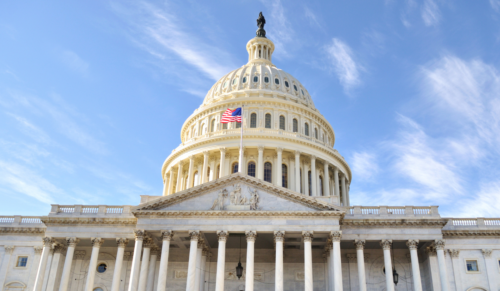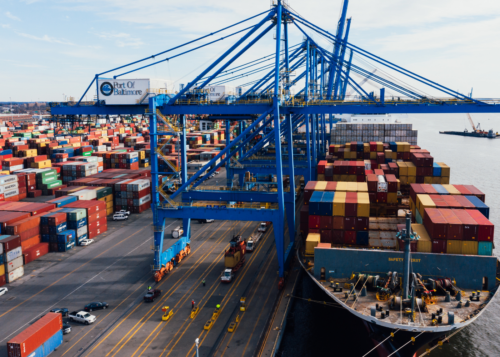PPI Returns from 2015 Digital Trade Mission to Europe
By: / 04.15.2015
Dear Friend,
We’re just back from Europe, where last week PPI led a bipartisan delegation of Congressional staff on a four-day swing through three capitals: London, Brussels and Berlin. Our goal was twofold: 1) to learn more about the European Union’s ambitious plan to create a “digital single market” and, 2) to press PPI’s case for moving digital trade from the periphery to the center of the transatlantic agenda.
Why is this so important? Consider these facts:
- The free movement of data raises the productivity of businesses and reduces trade costs, creating jobs and growth on both sides of the Atlantic.
- US/EU cross-border data flows are by far the highest in the world, 50 percent more than between the United States and Asia.
- America runs a large trade surplus in services, of which 61 percent are delivered digitally.
- The Internet is becoming a powerful export platform for small enterprises, connecting them to global customers at low cost.
As PPI has documented in a series of groundbreaking reports, digital innovation and commerce are increasingly driving economic investment and growth in America and Europe. We believe the transatlantic partners share a common interest in ensuring that digital trade enjoys the same legal protections as trade in physical goods and services. Instead of joining forces to extend free trade principles to digital commerce, however, Europe and America are embroiled in a raft of disputes that threaten to erect barriers to cross-border data flows.
Such disputes, for example, involve calls for data localization, for national or European clouds, for taxing data flows and for imposing stringent privacy or data protection rules on businesses. Right now, the European Court of Justice is considering a challenge to the “safe harbor” rules that have allowed US tech companies to operate in Europe. In addition, new tensions have arisen around issues of copyright protection, “platform competition,” tax avoidance and many core provisions of the proposed Transatlantic Trade and Investment Partnership (T-TIP).
As you probably know, PPI has long been a catalyst for transatlantic dialogue, going back to the Clinton-Blair “Third Way” conversations we helped to launch in the 1990s. Over the last four years, our work in Europe has focused on reviving transatlantic economic cooperation, with a particular emphasis on the rise of data-driven innovation and growth. At a time when authoritarian countries seek to limit the free flow of information, we think it’s crucial that the Western democracies work together to prevent the balkanization of the Internet and defend free digital trade.
That’s why we organized this second “Digital Trade Study Group”—a bipartisan group of 12 senior House and Senate staffers, whose bosses have oversight of issues related to trade, digital commerce, copyright, intellectual property, privacy, cyber security, and communications and technology. (We took the first such group to Europe in April 2014). Last week’s trip featured a productive round of high-level talks with prominent political, business, policy and media leaders.
Here are the highlights:
- In London, our traveling party met with Daniel Korski, Special Advisor to Prime Minister David Cameron, and Guy Levin, formerly special advisor to Chancellor of the Exchequer George Osborne, to discuss UK technology policy. As Michael Mandel, PPI’s chief economic strategist, has documented, London has emerged as one of the world’s premier centers for tech entrepreneurship.
- Vanessa Houlder, who covers economics for the Financial Times, briefed our group on the Cameron government’s controversial new “diverted profits tax.” Aimed ostensibly at discouraging tax avoidance, it slaps a 25 percent tax on the local profits of U.S. and other foreign companies operating in the UK, and has been dubbed the “Google tax” by detractors.
- Also in London, PPI released a new policy brief by Mandel, Taxing Intangibles: The Law of Unintended Consequences. It notes that digitized information differs from physical goods and services in that it can be duplicated at negligible cost and used by different consumers at once. As such, Mandel argues, it makes little sense to tax this intangible knowledge as one would a car or the provision of a unique service. In fact, new proposals for taxing intangibles will undermine global growth and thus be self-defeating, the report argues.
- In Brussels, two officials of the European Commission’s DG Connect unit, Eric Peters, Deputy Head of the Single Market Unit and Tamas Kenessey, Legal Officer, briefed the group. The Digital Single Market, they stressed, is the EU’s top priority. It would enable tech companies that start in one of the Union’s 28 countries to grow to continental scale, and speed the onset of what we call the “Internet of Things.”
- Over dinner, the Digital Trade Study Group heard from Ken Propp, Legal Counsel with the US Mission to the EU, and Paul Hofheinz, President of the Lisbon Council, PPI’s think tank partner in Brussels. The discussion centered on the headwinds T-TIP has encountered and political differences within the EU on digital policy.
- Then it was on to Berlin, for lunch with two leading Green Party officials, Konstantin von Notz, a Member of the German Bundestag, and Dieter Janacek, the party’s spokesman on economic issues. The Greens are strong backers of Europe’s Data Protection Regulation, which our speakers noted reflects Germany’s unhappy experience with secret police agencies of the past. Joining us for dinner was Torsten Riecke, an international correspondent for Handelsblatt, who gave our group an insider’s perspective of German domestic politics, as well as its increasingly central role in European politics. The next morning, we drilled deeper into German concerns about data protection and privacy with Marcus Loning of the Stiftung Neue Verantwortung and former Free Democratic Party Member of the German Bundestag.
- Our group received an insightful briefing on Industrie 4.0—Germany’s equivalent of the “Internet of Things.” As explained by Boris Petschulat, Deputy Director General at the German Federal Ministry for Economic Affairs & Energy, Industrie 4.0 seeks to digitize production without disrupting its finely honed industrial export machine.
- We paid a visit to the Federal Association of German Newspaper and Magazine Publishers, which has been battling tech companies, especially Google, over copyrightand content issues. A lively debate ensued with Managing Director Christoph Fiedler and Christoph Keese, Vice President of the Axel Springer publishing empire. For more on this important subject, check out another just-released policy brief by Mandel, Copyright in the Digital Age: Key Economic Issues.
- Thomas Jarzombek, a member of the German Bundestag, who sits on the committee responsible for the digital agenda, elaborated on the German government’s efforts to build a digital infrastructure and nurture a more entrepreneurial, start-up culture.
- We finished our mission at the US Embassy in Berlin, where Ambassador John Emerson, a longtime PPI friend, offered a wide-ranging and insightful perspective on US-German relations.
PPI’s Digital Trade Study Group excursions to Europe serve two important purposes. First, they enable key Congressional staff from both parties to get a better understanding of European views on innovation policy, T-TIP, digital trade, privacy, copyright and other interests of mutual concern and transmit that knowledge to Members of Congress. Second, they underscore to our European friends the importance Congress attaches to transatlantic commerce in general and to data trade specifically.
This year’s mission advanced both of these goals. And it added important new dimensions to the extensive network of European political leaders, industry professionals, and policy analysts that PPI has built over the years. As always, I welcome any feedback you may have.
Sincerely,
Will Marshall
PPI President






